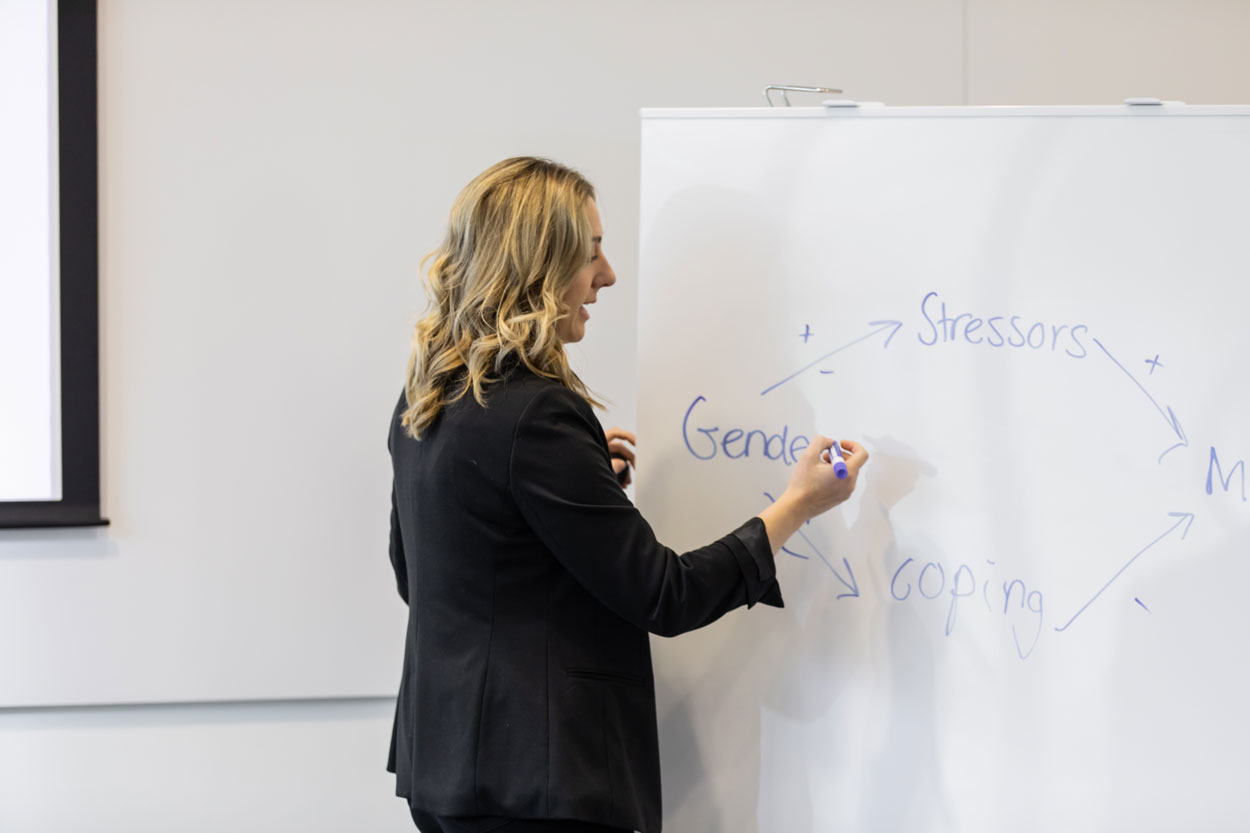Our Research
Researchers at Susan Hirt Hagen CORE conduct basic and applied research on risk and protective factors for youth.

A Holistic Approach to Research and Positive Impact
We approach our research on positive youth development from a holistic perspective, leveraging the positive impact families, schools, and communities can make in kids’ lives. We also use a strengths-based approach by promoting constructs such as hope, resilience, and a growth mindset to bolster youths’ socioemotional outcomes. Although, we dually recognize that risk factors play a role in attenuating optimal outcomes. To this end, we study the impacts of occurrences like bullying and trauma on youth outcomes.
Prevention and Intervention Research
We endorse a four-step public health model rooted in the scientific method, in which we first work with organizations and schools to define the problems they want to solve. Then, we target relevant risk and protective factors to optimize individuals’ development. Third, we develop prevention or intervention strategies and use various methodologies to test their effectiveness. Finally, we implement the evidence-based strategies in relevant contexts. Our prevention and intervention efforts can be both universal and targeted in scope.
Risk and Protective Factors for Youth
CORE is committed to researching both risk (e.g., bullying) and protective (e.g., empathy) factors in an effort to optimize youth’s development over time. We know that this two-pronged approach is necessary to secure the very best outcomes for our youth. CORE relies on sound research to build effective prevention and intervention strategies to equip students with important protective factors (e.g., connection, empathy).
Empathy
Empathy is the glue to meaningful social connection. It helps us understand others’ perspectives and ultimately leads to increased prosocial behaviors. We also know there are also gender effects such that empathy decreases among males and increases among females. We continue to target empathy in our prevention and intervention programs.
Bullying
Bullying is a form of peer mistreatment (both online and in person) and a public health concern that affects our youth daily. It can come in the form of exclusion, rumor spreading, name calling, and physical aggression. How prevalent is bullying? Our own research with thousands of students, shows that almost 50% (49.6%) of youth have been hurt or excluded by others at school in the past month.
Why does that matter? Bullying is considered an adverse childhood experience (ACE), that is related to increased depression, anxiety, substance use, and suicidal behavior. We endorse using trauma-informed approaches to provide students with environments replete with compassion and respect.
Trauma-Informed and Strength-Based Approaches
Children who are exposed to ACEs are at risk of depression and other at-risk behaviors. A trauma-informed approach is needed for bullying prevention and intervention efforts to build and sustain a schoolwide sense of safety, which aligns with the primary (universal) prevention tier of the public health model.
Growth Mindset
Having a growth mindset embraces the struggle and effort needed to grow skills, purpose, resilience, and relationships. This mindset encourages us to chase challenges and grow from them. Importantly, research shows us that the growth mindset is not just for academics. Having a growth mindset also positively affects our social and emotional development, as well as our well-being and adjustment. The bottom line? What you believe MATTERS!
Social Determinants of Health
While we specialize in preparing people for life’s challenges, we also acknowledge the influence social structures have on our well-being. Based on our socioeconomic class, gender, race and other social identities, society sets us up for different life circumstances. Research that brings awareness to and challenges these societal influences are critical steps to equity.
Clinton Faupel, Executive Director of RemedyLive

Megan E. LaMotte, Ph.D.
Associate Director of Research & Evaluation
Dr. Megan LaMotte is a social psychologist who joined the Penn State Behrend faculty and was appointed as the Associate Director of Research and Evaluation at CORE in 2024. She grew up 4 hours southeast of Behrend in Danville, PA and earned her bachelor's degree in psychology and women/gender studies from the University of Delaware in 2015. For three years between undergraduate and graduate school, she worked at Geisinger Health System’s Obesity Institute, a clinic-based research center aimed at reducing obesity and its comorbidities. This was an invaluable experience: getting to be a part of a robust applied research team involved in everything from pharmaceutical trials to biobanking and behavioral interventions. Dr. LaMotte then began graduate school at the University of Nevada, Reno to pursue her interests in social psychology. There, she strengthened her methodological toolkit, studying advanced statistics and research methods. Her topical expertise includes the social patterning of mental health by way of the stress process. In other words, how our social statuses (e.g., our race, gender, and class) influence our exposure to stressors, how we cope, and the consequences to our well-being. To CORE, Dr. LaMotte brings a passion for research that shines light on how society can increase equity in well-being.
![CORE_Tier3_Horz_Reverse_FullColor[11] Penn State Behrend CORE Logo](https://core.psu.edu/wp-content/uploads/2025/09/CORE_Tier3_Horz_Reverse_FullColor11-scaled.png)


